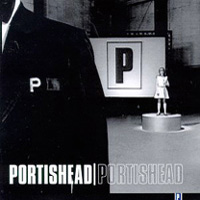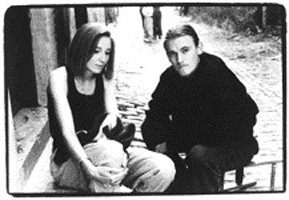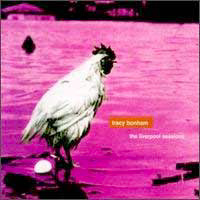 Portishead
Portishead
(London)
An interview with Adrian Utley
by Nik Rainey
Appropriate songs come at appropriate times. For me, no song captured the numb, discombobulated feelings of the horrible year of 1994 more stunningly than one of the last singles released that year – “Sour Times (Nobody Loves Me),” the debut of a little UK band known as Portishead (named after the small Bristol suburb that head Portis Geoff Barrows calls home). Bands like Massive Attack had already created an underground buzz by melding the cut-and-paste constructions of hip-hop, the wide-screen sound of film soundtracks, and a touch of psychedelia, but that song was so enthralling it put the form that came to be known as trip-hop on the commercial map, becoming a surprise Stateside hit at a time when British bands were getting almost no notice in this country. The album Dummy followed, twelve extrapolations of the dramatic sound of the single, and suddenly Portishead was a hot commodity, celebrated for their cinematic flair both aurally and visually (courtesy of their dark, self-produced film,To Kill a Dead Man). Now, three years later, they have returned with their self-titled follow-up, reclaiming their signature sound and re-establishing their unique place in a field suddenly overrun with techno-crazed beat fiends. Contrary to popular opinion, Portishead is more than just Geoff and Beth – the usually silent partner Adrian Utley, multi-instrumentalist and co-writer of ten of Portishead‘s twelve songs, checked in from New York City to talk about the arduous process of creation and praise American room service coffee.
Dummy came out in late ’94 – why the three-year gap between that and this? Was it a function of the songwriting process?
It was that, and also since the last one we toured for quite a long time; once we came off tour – I can’t remember which year – we went straight into producing the new record. We changed our technique in that time – we stopped using samples of anyone else’s records, which meant that we had to make them ourselves, play, record, and go through many, many processes. It was a long affair. That was one reason, and the other was that we vaguely kind of lost our way in that time.
Why is that?
I think it was because the vocabulary that we had as a band, the sound we had, we were suddenly hearing all around us, which made us rather suspicious of our own sound. We felt that we had to reinvent ourselves. For at least a year, and possibly even longer, we just weren’t interested in the music that we were making. We also went through rather a major kind of writer’s block, even though we were in the studio every day for the last two years. Finally, we went into a residential studio in the English countryside and decided that we were just going to get some tracks together and get on with it.
Is isolation beneficial in that way?
It could have been. I think it was the fact that we were all together – Beth was with us in the studio, whereas she’s usually not, and there were no distractions – it was a constant, workaday sort of situation.
 Did success cause the creative block?
Did success cause the creative block?
It put more pressure on us, which we didn’t have while making Dummy. Our only thought while making the first record was to make enough money to pay for it, then go on and make another. But that all changed when Dummy was so well-received, it created an unnatural sort of expectation. There were all these factors that went into the big soup and affected what happened after that.
In those years as well, in the States at least, what the media calls “electronica” has really come to the forefront. Where does Portishead fit into all that?
I don’t know how to answer that. Isn’t electronica just a way to resell dance music to America under a new name? I don’t know that we fit into that at all, but then I really don’t know what electronica is. It could encompass everything from what the Silver Apples did in 1968 to what’s happening in the present day, so I don’t know. I think we have very much our own angle – I can’t see that we’re in the same category as the Chemical Brothers or Prodigy, which is little more than dance music. It’s hard to dance to Portishead.
Is trip-hop still viable from a media/publicity standpoint?
Yeah, I think so. Sitting here, talking to many journalists, we seem to have had a good response all down the line. I hope that’s indicative of what’s happening with the fans as well. The British music press are, and always have been, very fickle – find a band, build it up and knock it down again in a very short time – that’s the nature of it. I suppose it keeps the pace going in some way, but I don’t think you pay attention to that unless you’re some fly-by-night band who’s just looking to knock something out very quickly, which, of course, we’re not.
You mentioned Beth usually not being in the studio with you – I know she doesn’t do interviews either, and I saw a quote in Details describing her as a sort of Greta Garbo of trip-hop or something.
Oh, no, she’s not a great kind of mystery woman at all. I think that’s something that’s been built up by the press over the years, just by the fact that she’d rather be judged by her music than by sitting in front of a journalist talking. She’s not interested in it, so why make her do it? If it means we don’t shift quite as many units then so be it. The music comes first. But she’s just like the rest of us, always up for a laugh – she doesn’t sit about and brood. I don’t want to talk on her behalf about her lyrics, but I’m sure that that side of her is there and making the music that we do allows her to delve into it. But that’s not a side of her that any of us particularly know.
What is your background?
I was mainly a jazz musician, though I didn’t come from a total jazz background. I was always a musician and always making a living at being a musician, whatever that took. I got immersed in very straight-ahead jazz, not fusion or anything. I just threw myself into studying that all through the eighties, really. And I’ve always been interested in production and working in the studio, through doing session work. I was moving into a lot more studio work when I met Geoff. My head was really turned around by A Tribe Called Quest and Public Enemy in the late eighties, which is where I came to meet Geoff through our shared interest in hip-hop and the possibilities of the studio.
You play most of the “live” instruments on the record.
I suppose I’m the one for that for the most part, although Geoff plays drums and keyboards a bit, and we get John Baggett in on the keyboards when I can’t, because I’m not really a keyboard player but I can do enough to do the things we need done a lot of the time. We also have Clive Deane on drums, but I do quite a lot of it.
And yet the image in the press has always been that the band is essentially Beth and Geoff and that all the other musicians on the albums are just hirelings…
Geoff would say that it was naivete; on his part, because that was the way the record company played it at first. As far as they’re concerned, contractually I’m not a member of the band, but ever since Dummy I’ve done nothing else! We’re just beginning to address that now, which is why I’m here – I make as much of the music as anybody else, and I’m as happy to talk about it as to play it.
What currently do you like musically? What inspires you?
Radiohead are a big favorite, I like them… but I don’t know what inspires me, exactly. I try to make a distinction between what I like and what inspires me. In fact, I try not to listen to too much stuff that’s gonna bend my head around to their way of thinking. I’ll deliberately not buy a record if I think that it’ll pull me round too far to that way. For example, I had heard the soundtrack that Neil Young did for Dead Man…, the Jim Jarmusch film, which I thought was just brilliant and quite underrated over here, but the music was so simple and so potent that I told myself I wouldn’t buy the soundtrack lest it influence me too greatly. So for inspiration, I like to look backwards – Silver Apples, like I mentioned earlier, I’ve just discovered them recently.
They’re back together, I heard. Well, in part at least.
Yeah, one of them’s back together. I’m always buying records and listening to things – I’m quite into old electronics as well, which informed some of the songs on the new album, like “Half Day Closing” was very much inspired by the United States of America (the short-lived art-rock band, not the country). Someone brought that album into the studio and we built the track up from that – if you know the record, you’ll hear that the bass line is the same as one on that record. But there’re other things in there, like David Voorhaus, you know, that white noise composer? I’d heard him when I was very young and that was always a big influence, that kind of strange early electronic thing.
Of course, there was no template to work from then, was there? Everybody took their own exploratory approach without any notions of how it’s “supposed” to be.
Absolutely. They all sounded different, they didn’t give a damn whether it was commercial or sounded like anybody else, which is refreshing to hear, especially now.
As for To Kill a Dead Man, will you do another film like that?
Oh, no! (laughs) That wasn’t something we were particularly proud of. We had done it really just to do the soundtrack, and Geoff said that it would cost about the same as making a video, so we had a go – but we were so wooden in it, and it was done so manically that it’s really unsatisfying to look at. So I think we’ll stick to the music and keep our faces out of it.



